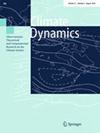E3SM大气模式参数敏感性的区域和云系依赖性
IF 3.7
2区 地球科学
Q2 METEOROLOGY & ATMOSPHERIC SCIENCES
引用次数: 0
摘要
摘要美国能源部(DOE)的能源百亿亿次地球系统模型(E3SM),包括其大气模型(EAM),具有许多相对较新的特征。在之前的研究中,我们基于短时间的扰动参数集合(PPE)模拟,主要关注全球平均气候特征和指标,对EAM进行了系统的参数敏感性分析。虽然全球气候模式的参数值在空间和时间上通常是不变的,但模式对参数扰动的响应可能因区域和气候状况而异,这促使我们需要更好地了解区域尺度和过程水平上的EAM模式行为和物理。在本研究中,使用相同的PPE模拟集和类似的灵敏度分析框架,我们确定了在不同地区引起最大灵敏度的参数,并比较了快速大气过程中的模式响应与不同云系中几个重要的云相关保真度指标的参数。我们发现,在中纬度地区,云强迫对某些参数的响应与热带地区相反。我们还分析了层积云在海洋上空向浅对流和深对流过渡时参数敏感性的变化。副热带东太平洋低云强迫和短波云强迫对海岸附近控制子网格垂直速度(w′)(gamma)的概率密度函数宽度(PDF)和w′偏度阻尼(c8)的参数最为敏感,而对近海影响w′方差阻尼(c1)的参数更为敏感。详细解释了参数灵敏度的空间依赖性。我们还研究了参数灵敏度随预测持续时间的变化。该研究提高了我们对云物理和参数化的过程级理解,并为开发更先进的全球气候模式状态感知参数化方案提供了见解。本文章由计算机程序翻译,如有差异,请以英文原文为准。
Region and cloud regime dependence of parametric sensitivity in E3SM atmosphere model
Abstract The Department of Energy (DOE)’s Energy Exascale Earth System Model (E3SM), including its atmosphere model (EAM), has many relatively new features. In a previous study we conducted a systematic parametric sensitivity analysis for EAM based on short, perturbed parameter ensemble (PPE) simulations, mainly focusing on global mean climate features and metrics. While parameter values in global climate models are generally invariant in space and time, model response to parameters perturbation may vary by regions and climate regimes, which motivates the need to better understand the EAM model behaviors and physics at regional scale and process level. In this study, using the same set of PPE simulations and a similar sensitivity analysis framework, we identify parameters that cause largest sensitivities over different regions and compare model responses in fast atmospheric processes to the parameters across different cloud regimes for several important cloud-related fidelity metrics. We find that cloud forcing has opposite response to some parameters over mid-latitude vs. tropical land. We also analyze how the parametric sensitivity varies as stratocumulus transitions to shallow convection and to deep convection over ocean. Low cloud forcing and shortwave cloud forcing in the subtropical eastern Pacific are most sensitive to the parameters controlling the width of the probability density function (PDF) of the subgrid vertical velocity ( w’ ) ( gamma ) and the damping of the w’ skewness ( c8 ) near the coast but become more sensitive to the parameter affecting the damping of the w’ variance ( c1 ) further offshore. Detailed interpretation of the spatial dependence of parametric sensitivity is provided. We also investigate how the parametric sensitivity evolves with prediction duration. This study improves our process-level understanding of cloud physics and parameterization and provides insights for developing more advanced regime-aware parameterization schemes in global climate model.
求助全文
通过发布文献求助,成功后即可免费获取论文全文。
去求助
来源期刊

Climate Dynamics
地学-气象与大气科学
CiteScore
8.80
自引率
15.20%
发文量
483
审稿时长
2-4 weeks
期刊介绍:
The international journal Climate Dynamics provides for the publication of high-quality research on all aspects of the dynamics of the global climate system.
Coverage includes original paleoclimatic, diagnostic, analytical and numerical modeling research on the structure and behavior of the atmosphere, oceans, cryosphere, biomass and land surface as interacting components of the dynamics of global climate. Contributions are focused on selected aspects of climate dynamics on particular scales of space or time.
The journal also publishes reviews and papers emphasizing an integrated view of the physical and biogeochemical processes governing climate and climate change.
 求助内容:
求助内容: 应助结果提醒方式:
应助结果提醒方式:


